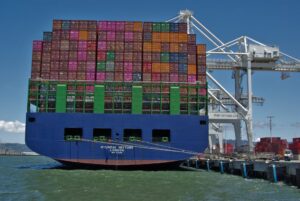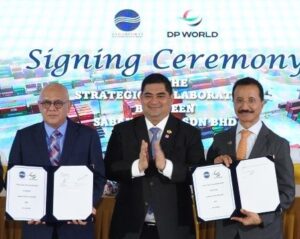In an interview with Tank World News recently, Edwin Lammers, Executive Commercial Manager of SOHAR Port and Free Zone, gives his views on the super tanker storage market, where he explores the falling price of oil and its impact on the global shipping industry.
Having joined SOHAR Port and Freezone in 2009, he has witnessed the expansion of almost the entire dockside infrastructure, including a US$130 million investment that increased the port’s container capacity to 1.5 million TEU.
See below for the interview:
How important is tank storage to the SOHAR Port and Freezone’s operations?
The Oil tanking Odfjell terminal at SOHAR has a storage capacity of 1.3 million cubic metres and has been critical to our ability to offer world-class services to the petrochemical industry since 2008.
Flexible systems and high pump capacity mean clean petroleum, petrochemical, and gas products and can also be loaded at 3,000 cubic metres an hour – or almost a cubic metre every second, which means a quick turnaround for liquid bulk vessels calling at the port.
With the price of a barrel of oil being so low, are you finding greater demand from traders to work with you?
The price of oil is a big talking point at the moment, and is having an effect on the shipping industry worldwide. In that sense, SOHAR is no exception.
However, since we are currently experiencing a period of tremendous growth, it is difficult to say whether traders, or anyone else for that matter, are reaching out to work with us because of the cost of oil globally, or because of our growing reputation and the increasingly competitive nature of our business.
Much has been written about the quantity of oil currently being stored on the high-seas on supertankers, is this a trend you can see continuing through 2015?
At the moment nothing is certain when it comes to oil, and the number of different articles being published on an almost daily basis makes it hard to know which direction the market will take. In terms of storing oil on the high-seas, there are an equal number of benefits as there are risks.
The challenge, of course, is that if interest rates or storage costs increase, the cost of storing oil out at sea would eclipse any future profits. In January, 2015, Reuters estimated that costs are already in the region of US$1.5 to $1.8 million per tanker. Will it continue through 2015 is anyone’s guess; with growing demand I don’t know if it will last.
As a port and freezone with an international focus, I’m interested to hear which new regions and countries you are seeing increase demand for your services?
Oman’s export partners are primarily in the UK, the US, India, Japan, Germany, and China, while its import partners include China, Singapore, Thailand, Korea, Japan, and [the] UAE.
Our aim is to harness trade between these regions and countries, from our strategic position at the midpoint between East and West, and from outside the Strait of Hormuz. India is a market that has proven to be very important on account of its close proximity to SOHAR, and our influence in the Far East is growing at key points every day – Singapore, Japan, and China.
And finally, what developments are next up for the port and freezone?
The food manufacturing and processing industry is the next big industry on the horizon for SOHAR. This will include Oman’s first terminal dedicated to agricultural bulk, 200,000 tonnes of grain storage capacity, a sugar refinery expected to generate around 1 million tonnes of raw sugar imports, and two multimillion dollar plastics projects that will provide the impetus for a food packaging industry.
We also signed an agreement with Essa Al Ghurair Investment in the last few weeks, who will lease a significant plot of land in order to attract processing and value chain industries and enhance the self-sufficiency of the food supply chain that is emerging. This will be important in reducing the cost of importing and exporting foods, not least because of the region’s heavy dependence on food imports – currently at 90%.
Edwin Lammers is an expert speaker at Tank World Expo, which is due to take place on April 13-14, 2015. Now in its third year, it is the best attended tank storage event in the Middle East.








